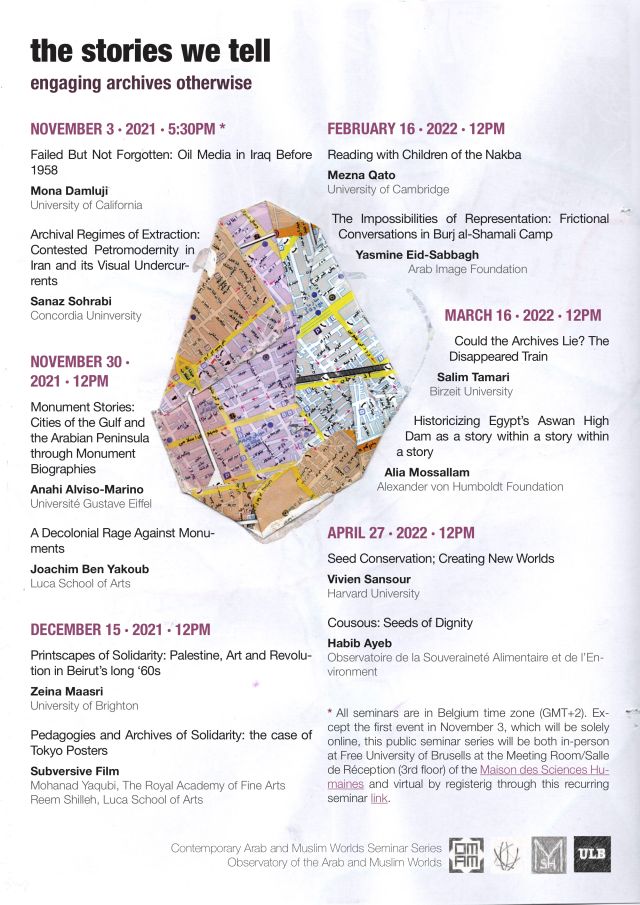SMMAC "Monument Stories: Cities of the Gulf and the Arabian Peninsula through Monument Biographies" & "A Decolonial Rage Against Monuments"
Le 26/01/2022
with Anahi Alviso-Marino, Université Gustave Eiffel & Joachim Ben Yakoub, Luca School of Arts
The stories we tell. Engaging archives otherwise – Contemporary Arab and Muslim Worlds Seminar Series (SMMAC) – 2021-2022
"Monument Stories: Cities of the Gulf and the Arabian Peninsula through Monument Biographies"
In the 1970s, Aden, Jeddah, and Kuwait City underwent an extraordinarily dynamic period, attracting cultural producers and agents who partook in designing the modern urban landscape of the Arabian Peninsula. Supported by state institutions, these cities reflected the national aspirations that local governments sought to realize through their urban cultural policy. Monuments and sculptures were commissioned to local and foreign artists to beautify public space and commemorate events, leaders, and sites. Albeit grand in size, the narratives behind their gene- sis remain largely unknown; rarely have there been studies contextualizing their historical, architectural, political, and artistic beginnings and significance. This research retraces the proverbial life and death of these monuments, aiming to develop a multimedia map elaborating the multiple stories that constructed their biography. I will be presenting ongoing protocols practiced within a research-creation collaborative project focused on monument biographies in the Arabian Peninsula. These protocols use and pro- duce digitized archives, filmed field-work notes, remote fieldwork data, maps, and ethnographic audiovisual materials.
Anahi Alviso-Marino is a scholar-researcher specializing in political sociology of visual arts in the Arabian Peninsula and currently a postdoctoral fellow (ingénieure d’études) at the collective “Penser l’urbain par l’image” (Labex Urban Futurs), University Gustave Eiffel/Ecole des Ponts ParisTech. She obtained her PhD at the University Paris 1-Sorbonne and the University of Lausanne, researching art and politics in Yemen; her MA from Columbia Univer- sity in New York; and her BA from Complutense University in Madrid. She works at the intersection of social sciences and artistic practices and has exhibited her archival and research materials from Yemen, Kuwait, and the United Arab Emirates in Paris at the Palais de Tokyo (« L’ennemi de mon ennemi » a project by Neïl Beloufa, 2018), and at the Villa Vassilieff (“One of many stories. Art worlds in Yemen”, 2017). She has contributed to “Modern Art of the Arab World: Primary Documents” (MOMA, 2018) and “Fu- ture Imperfect: Contemporary Art Practices and Cultural Institutions in the Middle East” (Sternberg Press, 2017). Her forthcoming book focuses on art and politics in Yemen. She is currently working on a collaborative research project and multimedia map with Neïl Beloufa charting monument stories across the Arabian Peninsula (Graham Foundation for AdvancedStudies in the Fine Arts).
"A Decolonial Rage Against Monuments"
In 2021, we not only commemorated 150 years of the Paris Commune, but also 10 years of reemerging planetary revolts, that kicked off in Tunisia in 2011. In the same way the story of Communards cannot properly be told without mentioning the fall of the Vendôme Column, the tale of the most recent upsurges of planetary revolt cannot properly be told without mentioning the intensification of what Bhakti Shringarpure (2012) called a “rage against monuments”. In the last decade, an archipelago of decolonial rage is spontaneously bursting out worldwide, targeting public statues that until today glorify the legacy of slavery, imperialism and colonization. From the settler colonial states of South Africa, the U.S., Canada, New Zealand, and Australia to the heart of the Empire in France, Belgium, and England, recent protests broke the polis in two. The national heroes sculpted in bronze revered by some, seem to represent contempt, injustice, oppres- sion and clear cut genocide for others, rendering visible a deep societal antagonism, going beyond the classical “left-right” binary opposition. Often dismissed as “merely symbolic”, the proposed paper want to look deeper into the entanglement of the symbolic and the more material and infrastructural aspects of this decolonial rage against monuments, wary of the warnings of Frantz Fanon (1961) that in colonial contexts, the economic infrastructure is always also a superstructure. Looking at movements of monumental Revolt in Tunis and Belgium in the light of the commemoration of 150 years of the Paris Commune, it is paramount to question, what is still left of the left and how to reconstruct from this monumental debris new caring forms of planetary alliances and forms of solidarities that could prefigure new ways of inhabiting the world differently, in freedom and dignity.
Joachim H. Ben Yakoub is a writer, researcher and lecturer operating on the border of different art schools, universities and institutions. He is affiliated to the MENARG and S:PAM research group of Ghent University, where he is conducting research on The Rhythm of Revolting Aesthetics in Brussels. He is lecturer at Sint-Lucas School of Arts Antwerp, where he is also promotor of the collective action research The Archives of the Tout-Monde.
This public seminar series will be both virtual and in-person at Université libre de Bruxelles.
Full program here
NEW DATE Wednesday 26th January 2022, 12 pm
Salle de réception
Building R - Level 3 - Room R3.105
Avenue Antoine Depage 1
1000 Bruxelles
To register please fill in this form
Contacts: Sahar Aurore Saeidnia & Omar Jabary Salamanca
Follow us on Twitter

